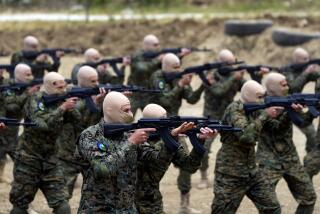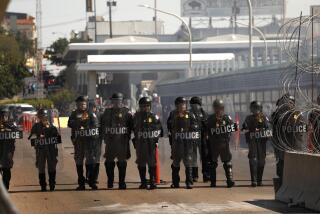Seven International Pariahs
- Share via
The State Department’s annual report on international terrorism again names seven countries as being involved in state terrorism. Iran once more is identified as terrorism’s “premier state sponsor,” financing and encouraging radical groups from North Africa to Central Asia, with Hezbollah militants in Lebanon the major beneficiaries of weapons, training and guidance. Rounding out the department’s list are Syria (the only one among the seven with official relations with the United States), Cuba, Iraq, Libya, North Korea and Sudan.
Coincidental with the release of this year’s survey was a report that investigators at the Belgian port of Antwerp had intercepted a large mortar and powerful shell hidden in a cargo of pickles on an Iranian freighter. The cargo was destined for Munich. Israeli Prime Minister Shimon Peres warned recently that Iranian weapons were being smuggled into Germany, presumably for use against Israeli or Jewish targets. The weapon found at Antwerp suggests both some pretty good intelligence about what Iran is up to and some welcome international cooperation on counter-terrorism measures.
The cheering news in the U.S. government report is that the level of state terrorism continued to decline, perhaps an indication of greater effectiveness in identifying and holding its sponsors accountable. Washington continues to seek even greater international anti-terrorism cooperation, a sometimes frustrating endeavor.
Defense Secretary William Perry recently called attention to what he identifies as an underground chemical weapons plant being built by Libya, a facility apparently equipped with technology supplied by several West European countries. U.S. officials leave no doubt they believe the plant’s sole purpose is to make weapons for terrorist purposes, and have all but promised a military attack to keep it from going into operation. That would be a dangerous though perhaps ultimately unavoidable step. Far preferable would be to persuade friendly countries to take more vigorous action to keep the materials needed to make chemical weapons out of Libya’s hands.
More to Read
Sign up for Essential California
The most important California stories and recommendations in your inbox every morning.
You may occasionally receive promotional content from the Los Angeles Times.










